#as opposed to the actual Brain Troubles which arguably have at least something to do with shit parenting
Explore tagged Tumblr posts
Text
What I mean by this is. I am neuroatypical in the So Hyper-Attuned To Shifts In Tone/Body Language That I Can Pick Up The Tiniest Social Vibe Shift With Terrifying Accuracy (Also My Brain Is Full Of Evil Ferrets That Insist The Tiniest Hint Of Displeasure Is Both My Fault And My Problem, And Attempt To Pull The Physiological Fire Alarms About It Even When I Am Objectively Aware This Is A Huge Overreaction) way. Feels a bit baffling to conclude that I am neuroatypical in the way that famously includes difficulties with reading tone/body language/indirect communication or social cues
Love and light to all autistic folks, I am not knocking it, but BOTH my parents separately suggesting that I might be autistic when my actual Issues TM are precisely the opposite of those Issues TM is really indicative of some things.
#people my entire life since I was tiny: wow you are spookily perceptive/observant/intuitive/good at reading people#thanks! it’s the anxiety!#anyway add this to the list of moments when i unkindly think (1) wow mom & dad u were made for each other and (2) wow i see why u divorced#SIMULTANEOUSLY#(the reason i am so bent out of shape is that what they both MEAN by this is ‘you are smart TM and mildly nonconformist#in a way that we find annoying and would like to pathologize’)#as opposed to the actual Brain Troubles which arguably have at least something to do with shit parenting#even tho i’m personally not that interested in legislating what or how much!#truly they are such different people except when they are exactly alike in the worst ways#anyway sorry i’m unduly annoyed about this#my posts
15 notes
·
View notes
Text
Movie Review: Dora and the Lost City of Gold

There is a line of thinking which holds that you will enjoy things more if you turn off your adult brain and think like a child. I disdain this argument for two reasons. First, it assumes children cannot appreciate quality in their entertainment. Second, it posits that if you do not enjoy something, it isn’t because that thing was flawed, but because you’re an old grump. Dora and the Lost City of Gold kicks away both of these tired assumptions and delivers an exciting, irreverent, funny, well-made film that could serve as the first great pulp adventure for kids too young for Indiana Jones, while being legitimately interesting to adults. It is proof of my frequent assertion that you can make a good movie out of any subject.
Dora, who debuted as a 7-year-old adventurer educating children on culture and language in one of Nickelodeon’s most successful shows, has grown up. She’s 18, played by Isabela Moner (who also voiced a ten-year-old Dora on a follow-up show). She’s lived all her life in the jungles of Peru, accompanied only by her adventurer parents (Eva Longoria and Michael Pena) and her monkey Boots (voice of Danny Trejo, and yes, you hear him talk through the monkey at one point). Her one human friend her age, her cousin Diego (Jeff Wahlberg) moved from the jungle when she was 6. Her parents have spent years on the trail of a lost Incan city named Parapata. Much like when you were a kid and wanted to do whatever it was your parents did, Dora inherits their love for adventure and frequently gets herself in trouble. After endangering herself to a particular degree while thinking she’s found the city, her parents decide she’s not gained enough responsibility to continue the search for Parapata with them, and send her to school in L.A. while they continue the search.
From the off, the movie is spiced with just enough irreverent humor to clue in those of us who have seen dozens of episodes of the cartoon that this is not that. The first few minutes strongly suggest that the entire TV show was actually just the product of Dora and Diego’s imaginations, though it somehow does so in a way that doesn’t feel dismissive of the kids who grew up with it. Once grown, screenwriters Nicholas Stoller and Matthew Robinson provide the still-wide-eyed Dora with more comic fodder riffing on the show; a seconds-long explanation of a dangerous flower (“Can you say severe neurotoxicity?”) had me laughing as hard as anything I can remember this year. The characters poke fun at the show in a way that feels loving rather than insulting (“Who is gonna recognize one specific fox?”). This may be chalked up to the fact that the movie chose to employ at least one bona-fide comedy writer: Stoller’s credits include Forgetting Sarah Marshall, still one of the funniest films of this century, and director James Bobin’s Muppets movies, which also had a successful balance of whimsy and satire.
Moner is the key to the movie’s success. Her Dora is excitable, energetic, and optimistic, but never cloying or insulting to any age of viewer. She may have grown up in the jungle, but she’s not stupid: she understands that some people are mean because they’re damaged, and she knows what sex and dating are (parents, take comfort: her comments about mating practices will, like much of the film’s adult-geared humor, pass by your little ones without notice). She regularly embarrasses the now grown Diego, who just wants to get through the day with as little drama as possible. “This is High School,” he insists. “It’s life or death,” and frankly my own High School experiences incline me to agree. Also attracting Dora’s attention are over-achiever Sammy (Madeleine Madden), who is a toned-down version of Rachel McAdams’ Mean Girls character, and Randy (Nicholas Coombe), a shy nerd who, although the movie never quite goes there with it, would be Dora’s perfect match. These companions, who naturally eventually end up on the search for Parapata, are not given the same emotional or comic development as Dora, but they are supposed to be foils for her, representations of flaws she does not possess who she can play off of, and they are successful at this.

Dora eventually stops receiving messages from her parents, deduces they are in trouble, and enlists her reluctant classmates to rescue them. This comes with the introduction of both a band of mercenaries working with a CG Swiper the Fox (voice of Benicio Del Toro) and a guide, Alejandro (Eugenio Derbez) who is not the clueless, bumbling adult of kids movies, yet also not quite the fearless explorer he would like the kids to believe he is. I particularly appreciated his role, which is developed to an extent adults in these movies rarely are.
The adventures in the jungle have the tone of amusement park rides the way you remember them from childhood, as opposed to the way they actually were. The special effects and sets are deliberately just this side of realistic---gigantic rainbow flowers that spit poison, a throne room that feels like something out of an escape room, and other locations remind you of the mix of unreality and immersion you get wandering a really good man-made park. The film offers extended surprises in the story, too. If you ever wondered why characters in adventure movies never have to use the restroom, this one somehow manages to address that in a way that is both hilarious and does not feel low-brow. Dora’s inevitable moment of doubt in her leadership abilities feels real and true. And there’s an extended callback to the cartoon, which I won’t spoil, that only a truly inspired creative team would ever have thought of, and only a truly trusting studio would ever have signed off on. (As a side note: are there any fans of Don Rosa in the audience? And did you get the sense, during the stunt with the sluice gate, that the writers have read a particular comic of his?). I can only imagine what wonderful ideas the filmmakers didn’t use for this entry. A lot of family films get sequels, but this is one of the only such movies that absolutely needs one.
People ask why I get so tired of all-ages entertainment that panders to what viewers have already decided they want, or that employs cheap use of pop songs and recycled gags instead of real wit. They want to know why I can’t just turn my brain off. It’s because, every so often, you get a movie like this, something in the grand tradition of Holes or The Red Balloon, which knows that if you make a good film, kids and adults will respond. Against, arguably, all odds, a TV show designed to teach young kids about the world has been transmuted into one of the best live-action family films you can get. If anyone else out there would like to take a cue from Bobin and company and start making their all-ages fare with actual brains and heart and risk, I just have this to say: “Swiper, yes swiping.”
Verdict: Highly Recommended
Note: I don’t use stars, but here are my possible verdicts.
Must-See
Highly Recommended
Recommended
Average
Not Recommended
Avoid like the Plague
You can follow Ryan's reviews on Facebook here:
https://www.facebook.com/ryanmeftmovies/
Or his tweets here:
https://twitter.com/RyanmEft
All images are property of the people what own the movie.
#dora and the lost city of gold#dora the explorer#isabela moner#michael pena#movies#eva longoria#james bobin#nicholas stoller#matthew robinson
55 notes
·
View notes
Text
Do Not Reblog
So after a lot of consideration, I’ve decided that Jason suffering from a Traumatic Brain Injury is going to become part of my blog canon. This is only going to apply to my main verse, and other verses where he died after being beaten by the Joker via use of a crowbar. There’s some canon evidence to support this decision, as evidenced at the end of Under The Hood and in Red Hood: The Lost Days by Judd Winnick.
More under the cut, so I’m not clogging up the dash.
In Under The Hood, Jason was said to have been dead for roughly six months before “fate” (aka Superboy-Prime punching reality) decided to set things right, as he was “never supposed to die.” He woke up, panicked because he was in a coffin and dug his way out, then apparently walked for 12.5 miles in the rain and dark with all of his injuries - as he wasn’t ‘healed’ upon waking up, so he had whatever he was suffering from before he died in the explosion, which according to the panel below included a cracked skull causing bleeding into the brain, a shattered sternum, flash burns and at least forty other fractures.
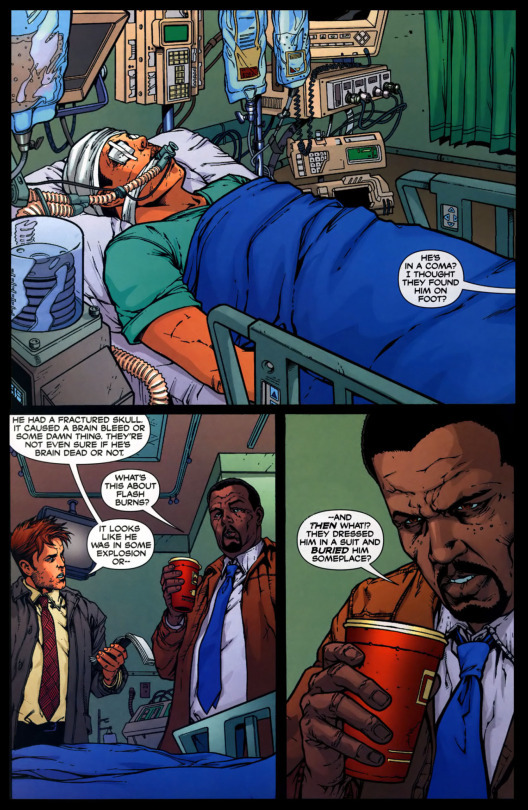
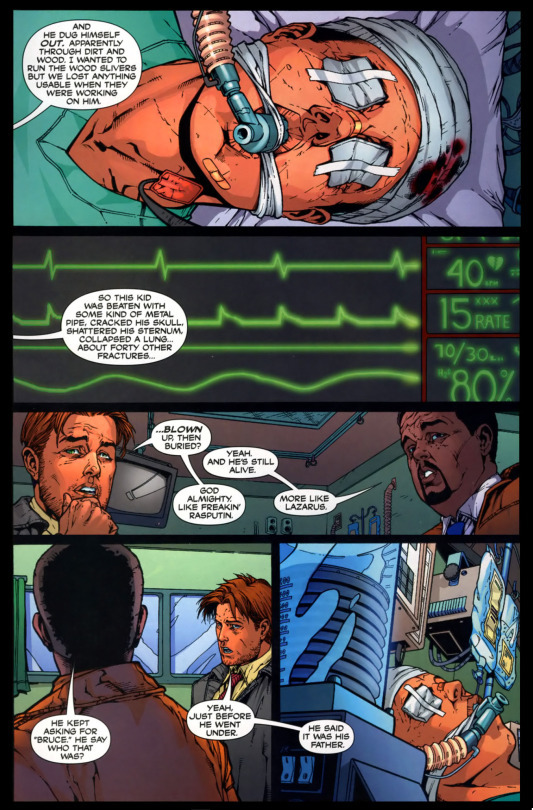
Although severely wounded the cops indicate he was awake and talking to them only to “go under” and presumably they didn’t think he was going to wake up after surgery because of the extent of his injuries. After slipping into a coma Jason was moved to a facility that cared for patients with minimal brain function. It states that he was now in a chronic vegetative state. So, not comatose, not healed, still unconscious and unresponsive, but not brain dead either. They go on to explain that it was his survival instincts that caused him to wake up even though his body shouldn’t have allowed him to.

Now, since you can’t be in a PVS (Persistent Vegetative State) and conscious at the same time, and they made sure to specify that a year had passed by the time he woke up (it takes only a few months to be declared PVS without brain trauma and at least 1 year with trauma), it seems likely that he went from being comatose, to vegetative, to finally a minimally conscious state.
According to multiple sources, people in a MCS, while not completely functional/aware, do retain some understanding of their conscious surroundings. There is enough to prove that this is distinctly different than people who are comatose or in PVS, as they are not conscious or aware of anything at all, even with stimulation. Jason woke up from a vegetative state and walked out of the hospital, surviving for more than a year on the streets while relying on his old instincts and what Batman taught him. He knew when he was cold, hungry, etc., and he also knew what to do to fix these problems.
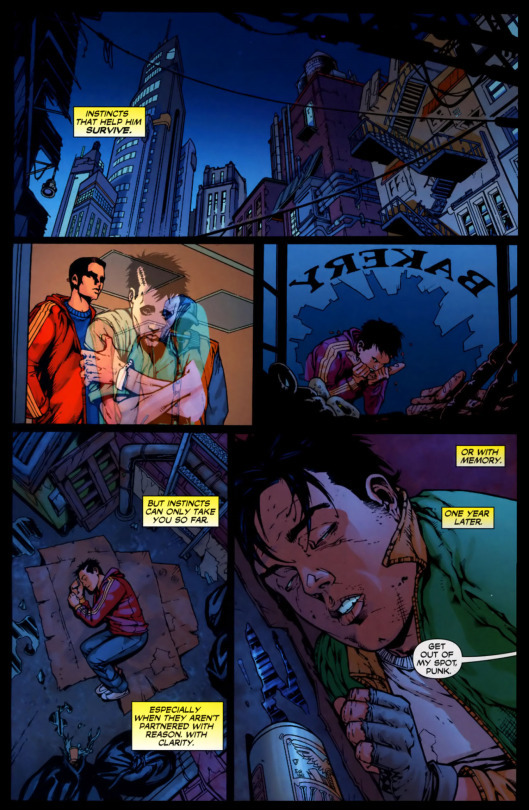
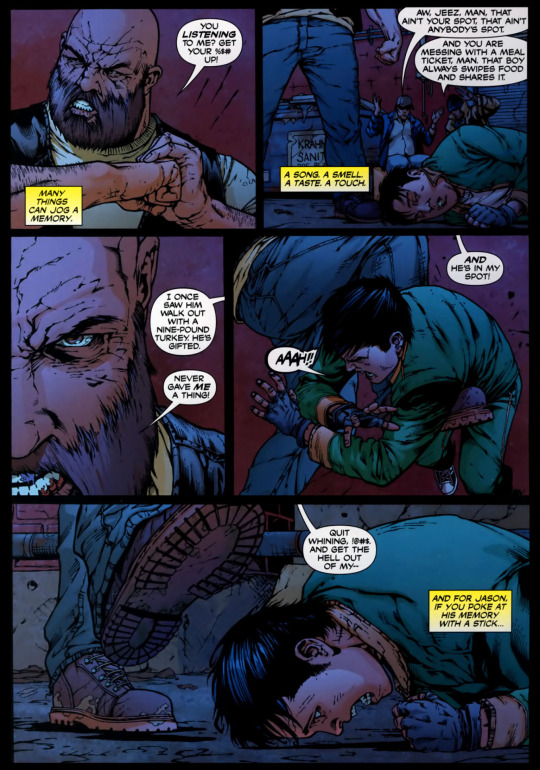
Yet, despite his survival skills, he doesn’t attempt to seek out Bruce, and he doesn’t speak even once (that we’re shown) between the time he slipped into a coma and when Talia pushes him into the Lazarus Pit. Either he doesn’t have enough awareness to remember his death/what happened to him, or he does but doesn’t have the ability to make decisions beyond survival reflexes. I have a theory, due to the two above panels and the term jog a memory, that Jason didn’t try to find Bruce despite being in Gotham because he didn’t remember him until he was put in danger. Think about it. He woke up in an unfamiliar place, in no physical pain, wandered outside…
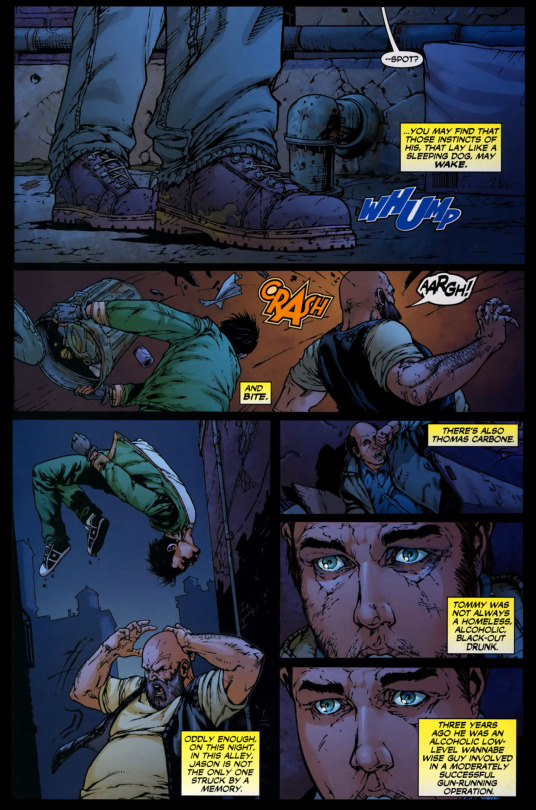
What was Jason doing before he met Bruce at age 12? He was living on the streets! Stealing to survive! So he went back to doing that. Whether he was aware something was wrong with him during this time is debatable, but it seems doubtful.
It’s more likely that the familiar environment of the alley and being subjected to pain (especially since that would have been the last thing he remembered before his death) just provoked a similar response that he would have had while being attacked as Robin.
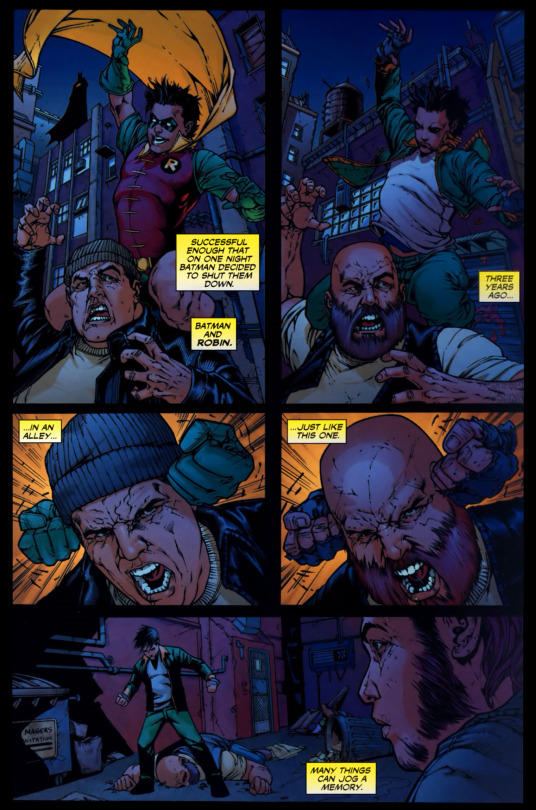
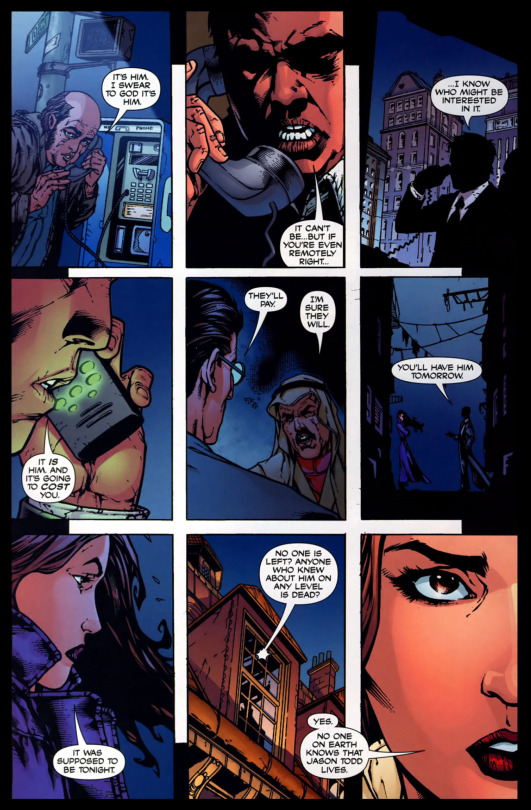
Don’t ask me why an alcoholic, homeless former criminal knew someone that was friends with Talia Al Ghul. They never explain.
Back to the point; aside from his survival skills Jason seemed unable to actually function in his condition. Talia knew it, as did Ra’s, and so did the doctors they hired. In the following final panels from Under The Hood, Ra’s admits that Jason could be useful one day but decides that after a year of trying to get Jason to respond enough to tell them how he came back to life, he’s unlikely to ever speak or…emote, ever again.
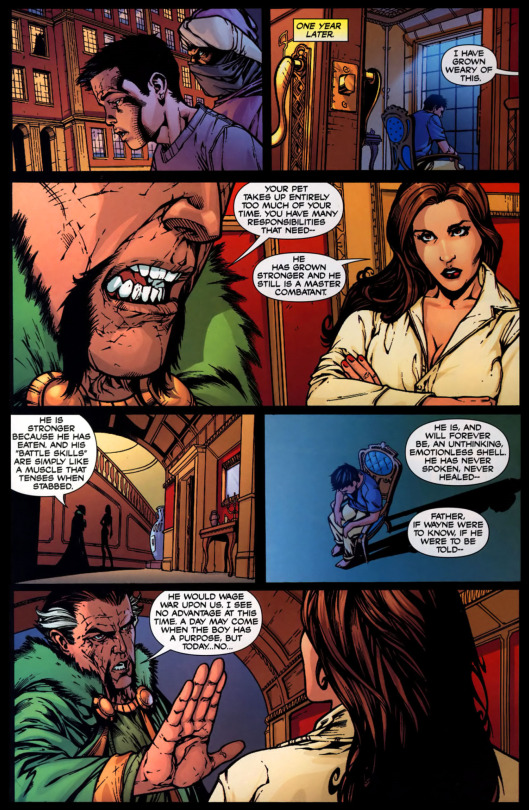
Despite multiple people insisting that Jason will never recover mentally, despite physically being at peak health and having the conditioning of an Olympic athlete, they all claim that his brain damage is too severe and that naturally he could never regain any form of awareness again. Talia disputes this, and she seems correct, to a degree.
Though he lashes out when provoked through pain, he never fights back when it’s her, something she’s quick to point out. This indicates he has enough awareness that he realizes this is a person trying to help him. Someone that cares.
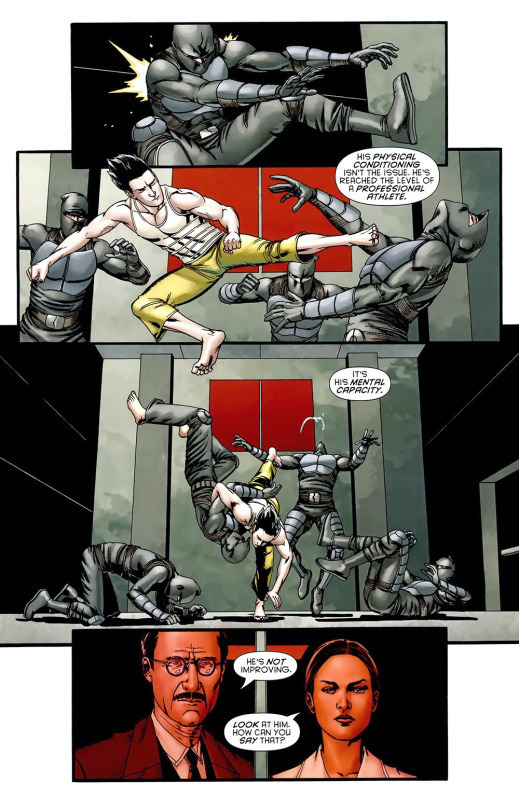
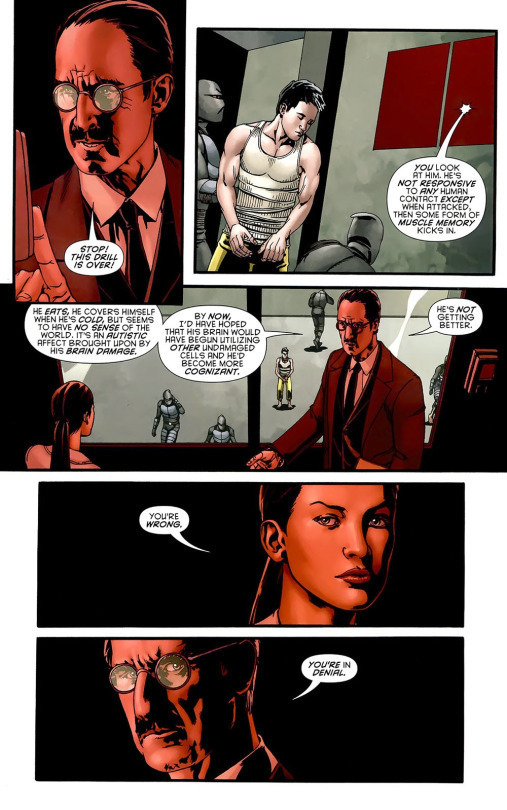
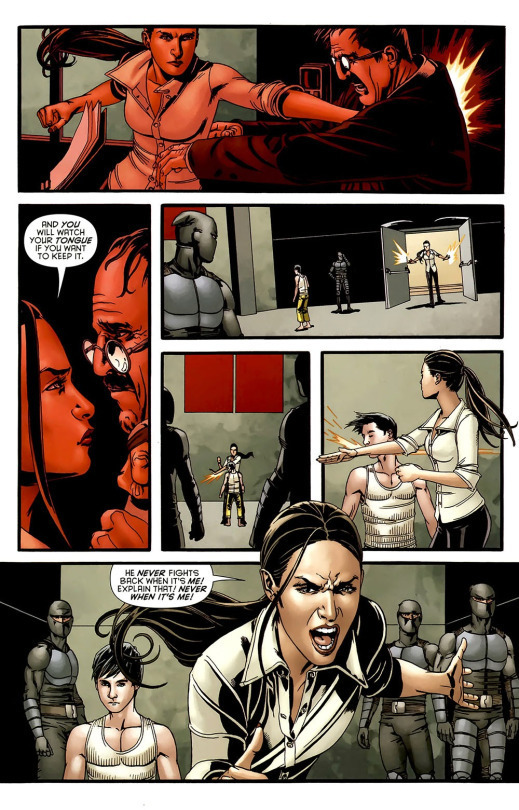
Supposedly, people in a minimally conscious state can exhibit emotional reactions to specific stimuli, such as smiling or crying. When Talia begins talking to Jason about Bruce, about how he misses Jason and has been grieving and suffering since his death, Jason doesn’t verbally respond in anyway, but he cries. Talia seems to understand that he does hear her, even though he can’t respond, which means he does remember Bruce, and he misses him too.


After being exposed to a Lazarus Pit, Jason regains all of his memories, his ability to speak, and consciousness of his surroundings as well as the other abilities he had before his death. However, due to the fact that his brain had several years time to heal before his exposure, and it was still developing at the time to boot (meaning he’s arguably mentally younger than he’s supposed to be, thinking like a 15 year old as opposed to a 19-20 year old), I find it likely that aside from “waking” him up, so to speak, it did little else. Although he has recovered enough to live the “normal” life of your typical gun-totting vigilante, Jason does still suffer from the side effects of the severe brain damage that Joker inflicted on him.
This includes cognitive problems that give him learning disorder like symptoms, such as Dyslexia, and difficulty reading fine print/fancy script especially. Early on he had a lot of trouble with some of his fine and gross motor skills, having to relearn many of them. There’s also neurobehavioral problems, which are described as behavioral problems attributed to specific aspects of a brain injury. Individuals may develop difficulty with self-control, impulse control, frustration, anger and aggression issues, and behaving with inappropriate ways socially. Physical therapy/training, something Jason participates in frequently because of his lifestyle, can help repair muscle and neuromotor skills. While he is frustrated frequently due to the limitations he suffers from, it’s not enough that it actually prevents him from doing most things.
It’s mostly mental deficits that impede his day to day life. TBIs can cause emotional, social, or behavioral problems and changes in personality. Jason in particular is emotionally unstable and suffers from depression (occasionally to the point of being self destructive and at times suicidal) and anxiety that are linked to his trauma, social withdrawal, inability to control his anger… he has insomnia and goes through bipolar-like mania not unrelated to his PTSD, and his psychosis can be triggered by unexpected things (such as the video will Bruce left him after he supposedly died, an example of by far one of his worst mental breakdowns).
7 notes
·
View notes
Text
Diath & the Waterdeep Underground
Okay!! So!! It’s high time that I actually got around to cross-posting this over here!! I can’t believe it’s taken me so long!!
This is a theory that I’d been working on since *wobbly hand motion* mid- to late Season Three? I polished it up enough to post about two months ago but only ever got around to doing so on the DCA subreddit (bc that’s where there was more activity at the time) and always intended to get it over here as well and then just. never did.
So! Here’s the theory, as originally presented two months ago. I intend to add an edit/update at some point with all the new evidence from Episodes 116 and 117 but I haven’t had the time or energy to do so yet.
So! Without further ado! My “Diath’s got a history with Waterdeep’s criminal underground” theory!
(Note: due to the recent complications re: Tumblr And Links and the fact that I want this post to show up in the tag, all the timestamps which were linked in the subreddit version have been changed to URLs in this one. It’s a bit clunky to read but it’s the best I can do rn *shrug*)
I think Diath has a history with some part of the criminal underground in Waterdeep. Specifically, that he was part of it.
Diath’s past is something about which we know very, very little. He very rarely talks about it and usually in the broadest possible terms when he does; Episode 73 is the exception to this, with the stories he shares there being the most detail he has shared about events in his past. There is, however, one consistency which can be identified on the occasions when he does talk about it – he only ever talks about his time on the streets as a part of his childhood. This is not a solely in-universe thing either – Jared and Chris both do the same. (I believe so, at least. If I’m incorrect, please let me know and maybe provide me a timestamp/link to when whatever they say is said, if you can! It’d be useful information to have on hand for future theorising in this regard) Diath very much seems to be a precision oriented person by nature. His wording of things is often very deliberate. Therefore, with his time begging on the streets being specifically referred to as a part of his childhood, along with the meta-aspect of this additionally being consistent out of universe, we can surmise that he was no longer in the position of begging on the streets after his childhood.
If we’re to assume that childhood is including his teenage years (which seems a reasonable assumption, with how often Diath is teased about being a child post-Youth Potion) then Diath was, presumably, off the streets either at or around the age of eighteen/nineteen.
In Episode 73, when telling the story of how he met Strix, Diath states that he “was just trying [his] hand at being an adventurer” (https://youtu.be/6SuM1qebiXM?t=19m29s), indicating that they met relatively early into his adventuring career, which we can use to make a rough estimate of what age he began adventuring, admittedly with a lot of guesstimating.
We know that he was twenty eight at the beginning of the show. As of Episode 1, the Wafflecrew had been together for a “short while”, which we know was long enough to have been on a few adventures together but short enough that they were still figuring out group dynamics and the like – I would place this period of time as somewhere between two months and a year. We also know that he and Strix had known each other for “a few years” before they met Evelyn and Paultin – a period of time which I would place as being roughly three or four years, as five or more feels too many to be accurately described as “a few”.
Therefore, working with the largest numbers estimated above, it’s possible that Diath began adventuring somewhere in the range of five years prior to Episode 1, at age twenty three.
With the previous conclusion of Diath having no longer been begging at eighteen/nineteen and this new conclusion of him having not started adventuring until twenty three, this gives us a four/five year window in which to wonder ‘what exactly was he doing?’
But why think that he may have been involved in crime during that potential period? I have a few reasons, which are as follows:
Firstly, it has been alluded to on multiple occasions throughout the show that Diath has been in trouble with the law in Waterdeep either a significant number of times or one very memorable and impactful time. While I haven’t gone through the whole show to track down every reference to this, mostly because I don’t remember which episodes they’re all in and I don’t have the time (or, admittedly, patience) to go searching for them, I have got a very early one – in Episode 7, when he’s being arrested by the guards in Vallaki, Jared remarks that this is “not [Diath’s] first time [being arrested]” (https://youtu.be/STnBV8C61vM?t=19m52s). Additionally, Jared mentioned in an Idle Champions interview that Diath “technically […] has a criminal record.” (https://www.twitch.tv/videos/292683322?t=38m03s) While that could be a reference to the times that Diath (and the rest of the Wafflecrew) have got into trouble over the course of the show, the use of the phrase “criminal record” implies, to me, that that is a circumstance that is rather more official than most of the trouble the ‘crew have been in. Additionally, when he triggers the trap door in Castle Ravenloft and gets dropped into a dungeon cell in Episode 30, Diath’s response of being sad is explicitly noted to be because “[he] never wanted to be behind bars again.” (https://youtu.be/Y03julVmXNE?t=40m27s) This could quite likely be linked to Diath’s issues with cages (as displayed in Ironslag (https://youtu.be/dS_QMZOO5Og?t=1h4m33s)) but, again, the wording leads me to think there’s other possible connections – that phrase is usually used to refer to being in a jail cell or in prison, after all. Diath’s response to being in the cell is also quite markedly different to his reaction to being in the cage – frustration and sadness, as opposed to a borderline panic attack. The two are not necessarily mutually exclusive, though; Diath’s dislike of ending up in that cell could be related both to past trouble with the law and to whatever his trauma regarding cages is.
Secondly, in Episode 53, it’s revealed that Diath was sold by his family when he was young enough that he barely remembers them (https://youtu.be/jZrd26ImgyU?t=56m49s). A human brain generally starts laying down retrievable memories at roughly the age of three, so the presence of any memories of them at all means that Diath must have been at least that old when those events transpired. We also know from later reveals that he remembers at least enough to know his father’s name – Ashton – though this was clearly a later recollection as he did not recognise the name at all when first confronted with it when given Gutter by the dworc in Citadel Adbar. With that information, I would estimate that Diath was between the ages of three and six when he was sold. Additionally, as far as we know, he came from a working class family with an adventurer father.
Why is this significant information to this theory in particular? Simple.
Diath can read and write.
There is no point in his backstory that we currently know of where he could’ve learned or been taught those skills. Even had his birth family had access to the skills or resources to teach him, he wasn’t with them, and spent a large portion of his childhood begging on the streets. Diath having either of those skills, let alone both, is odd. And in addition to reading and writing, he’s also got a fairly refined speech pattern and even knows some words that Evelyn, a noble-born child primarily raised in a temple, doesn’t (see: the stationary exchange in episode 94) which is, again, pretty unusual for someone who seemingly went straight from beggar to adventurer. It’s possible that Diath is self-taught but it’s just as possible, if not more likely, that there’s some unknown period in his past where there was someone who taught him. The questions left to us in that scenario, then, are who and why? Knowing Diath and how things generally go for him, it’s unlikely it was someone performing an act of altruism. In concert with the other possible pieces of evidence for this theory, it doesn’t seem too out there to speculate that he was, perhaps, taught because it could be a useful skill for him to have for whoever he was working for. This could also explain his speech pattern, as it could account for him being around a person, or people, who spoke like that enough to start doing it himself, something which would be much more unlikely on the streets.
Thirdly, it seems to have been implied that, in certain parts of Waterdeep at least, Diath has a reputation that paints him as a thief, or someone with the potential to be one. In Episode 73, when talking about how he and Strix met the rest of the Wafflecrew, Diath is very, very certain that the hostility and accusation from the innkeeper was because of and directed at him (https://youtu.be/6SuM1qebiXM?t=25m16s). The only elaboration that he gives on being so sure that the innkeeper was accusing him specifically and not targeting him and Strix because of Strix being a tiefling is stating that "when you stay in Waterdeep long enough, doing the things you do, you do develop a sort of... reputation, either by- either through truth or not.” (https://youtu.be/6SuM1qebiXM?t=23m59s). He doesn’t actually tell us what that reputation is or give any hints as to how it may have come about. While stereotypes could arguably be at play, given that the Rusty Pommel was apparently fairly seedy and in a seedy part of town, it seems unlikely that Diath was the only former street kid or the only rogue in the establishment. His certainty implies it was something about him specifically that caused that incident, especially with the comment about reputations. In Episode 90, Evelyn of Shar’s use of the fear spell reveals to us that one of Diath’s worst fears is Awful!Diath, his mirrored self. Specifically "He hates seeing that that is what everyone else sees him as, and that's what he could have been, that he tries to fight every day to not be." (https://youtu.be/PDG4KidCIXU?t=1h28m48s) This fear is likely linked to the aforementioned implied reputation. What is of particular interest to this theory, however, is the latter part of that sentence – “that’s what he could have been, that he tries to fight every day not to be.” While this could simply refer to how Diath could have taken a different path growing up, it could also mean that it was a path he had already started down, and turned back from. With that possibility in mind, it’s also entirely possible that the reputation he seemingly has that caused the conflict in the Rusty Pommel is not, as would seem the first interpretation of his statement from what we know of Diath, an untruthful reputation of being a thief, but rather a truthfully earned one of being a criminal – after all, everyday people who don’t know Diath would have no way of knowing about his personal moral code against stealing. If he had a reputation as a criminal, there would be no reason for people not to assume that this would include thievery. The ambiguity of his wording, “doing the things you do”, could also lend credence to this possibility. Diath is very good at keeping secrets and using an ambiguous phrase to not technically lie is something he could very easily have been doing with that statement.
My final reasoning is that, since the return to Waterdeep but particularly in Episode 102, we have been shown that Diath has a pretty wide network of contacts – referred to by Chris as his “society of confederates” – to the point that with their help he was able to rally the city guard to catch the Xanathar Guild members who stole Waffles within hours of returning to Waterdeep. Combined with the potential evidence for this theory, this is interesting, since it could point to what degree he was involved, but it isn’t strictly evidence for this theory on its own.
None of these things alone necessarily point to Diath having been involved with some aspect of the criminal underworld in Waterdeep but I feel like they make for a compelling case when looked at together. What do you think?
#dice camera action#dca#diath woodrow#it's!! been way too long!!! since I posted theory content on this blog!!!#waitwaitwait hang on what was my theorising tag theme#I HAD A THEME#WHAT WAS IT#OH RIGHT I REMEMBER#Tmae overanalyses DCA#THERE WE GO. KEEPING WITH THE THEME.#also I can't wait to add all the stuff from 117 because there was SO MUCH FUEL FOR THE FIRE
20 notes
·
View notes
Text
Do Not Reblog
So after a lot of consideration, I’ve decided that Jason suffering from a Traumatic Brain Injury is going to become part of my blog canon. This is only going to apply to my main verse, and other verses where he died after being beaten by the Joker via use of a crowbar. There’s some canon evidence to support this decision, as evidenced at the end of Under The Hood and in Red Hood: The Lost Days by Judd Winnick.
More under the cut, so I’m not clogging up the dash.
In Under The Hood, Jason was said to have been dead for roughly six months before “fate” (aka Superboy-Prime punching reality) decided to set things right, as he was “never supposed to die.” He woke up, panicked because he was in a coffin and dug his way out, then apparently walked for 12.5 miles in the rain and dark with all of his injuries - as he wasn’t ‘healed’ upon waking up, so he had whatever he was suffering from before he died in the explosion, which according to the panel below included a cracked skull causing bleeding into the brain, a shattered sternum, flash burns and at least forty other fractures.


Although severely wounded the cops indicate he was awake and talking to them only to “go under” and presumably they didn’t think he was going to wake up after surgery because of the extent of his injuries. After slipping into a coma Jason was moved to a facility that cared for patients with minimal brain function. It states that he was now in a chronic vegetative state. So, not comatose, not healed, still unconscious and unresponsive, but not brain dead either. They go on to explain that it was his survival instincts that caused him to wake up even though his body shouldn’t have allowed him to.

Now, since you can’t be in a PVS (Persistent Vegetative State) and conscious at the same time, and they made sure to specify that a year had passed by the time he woke up (it takes only a few months to be declared PVS without brain trauma and at least 1 year with trauma), it seems likely that he went from being comatose, to vegetative, to finally a minimally conscious state.
According to multiple sources, people in a MCS, while not completely functional/aware, do retain some understanding of their conscious surroundings. There is enough to prove that this is distinctly different than people who are comatose or in PVS, as they are not conscious or aware of anything at all, even with stimulation. Jason woke up from a vegetative state and walked out of the hospital, surviving for more than a year on the streets while relying on his old instincts and what Batman taught him. He knew when he was cold, hungry, etc., and he also knew what to do to fix these problems.


Yet, despite his survival skills, he doesn’t attempt to seek out Bruce, and he doesn’t speak even once (that we’re shown) between the time he slipped into a coma and when Talia pushes him into the Lazarus Pit. Either he doesn’t have enough awareness to remember his death/what happened to him, or he does but doesn’t have the ability to make decisions beyond survival reflexes. I have a theory, due to the two above panels and the term jog a memory, that Jason didn’t try to find Bruce despite being in Gotham because he didn’t remember him until he was put in danger. Think about it. He woke up in an unfamiliar place, in no physical pain, wandered outside…

What was Jason doing before he met Bruce at age 12? He was living on the streets! Stealing to survive! So he went back to doing that. Whether he was aware something was wrong with him during this time is debatable, but it seems doubtful.
It’s more likely that the familiar environment of the alley and being subjected to pain (especially since that would have been the last thing he remembered before his death) just provoked a similar response that he would have had while being attacked as Robin.


Don’t ask me why an alcoholic, homeless former criminal knew someone that was friends with Talia Al Ghul. They never explain.
Back to the point; aside from his survival skills Jason seemed unable to actually function in his condition. Talia knew it, as did Ra’s, and so did the doctors they hired. In the following final panels from Under The Hood, Ra’s admits that Jason could be useful one day but decides that after a year of trying to get Jason to respond enough to tell them how he came back to life, he’s unlikely to ever speak or…emote, ever again.

Despite multiple people insisting that Jason will never recover mentally, despite physically being at peak health and having the conditioning of an Olympic athlete, they all claim that his brain damage is too severe and that naturally he could never regain any form of awareness again. Talia disputes this, and she seems correct, to a degree.
Though he lashes out when provoked through pain, he never fights back when it’s her, something she’s quick to point out. This indicates he has enough awareness that he realizes this is a person trying to help him. Someone that cares.



Supposedly, people in a minimally conscious state can exhibit emotional reactions to specific stimuli, such as smiling or crying. When Talia begins talking to Jason about Bruce, about how he misses Jason and has been grieving and suffering since his death, Jason doesn’t verbally respond in anyway, but he cries. Talia seems to understand that he does hear her, even though he can’t respond, which means he does remember Bruce, and he misses him too.


After being exposed to a Lazarus Pit, Jason regains all of his memories, his ability to speak, and consciousness of his surroundings as well as the other abilities he had before his death. However, due to the fact that his brain had several years time to heal before his exposure, and it was still developing at the time to boot (meaning he’s arguably mentally younger than he’s supposed to be, thinking like a 15 year old as opposed to a 19-20 year old), I find it likely that aside from “waking” him up, so to speak, it did little else. Although he has recovered enough to live the “normal” life of your typical gun-totting vigilante, Jason does still suffer from the side effects of the severe brain damage that Joker inflicted on him.
This includes cognitive problems that give him learning disorder like symptoms, such as Dyslexia, and difficulty reading fine print/fancy script especially. Early on he had a lot of trouble with some of his fine and gross motor skills, having to relearn many of them. There’s also neurobehavioral problems, which are described as behavioral problems attributed to specific aspects of a brain injury. Individuals may develop difficulty with self-control, impulse control, frustration, anger and aggression issues, and behaving with inappropriate ways socially. Physical therapy/training, something Jason participates in frequently because of his lifestyle, can help repair muscle and neuromotor skills. While he is frustrated frequently due to the limitations he suffers from, it’s not enough that it actually prevents him from doing most things.
It’s mostly mental deficits that impede his day to day life. TBIs can cause emotional, social, or behavioral problems and changes in personality. Jason in particular is emotionally unstable and suffers from depression (occasionally to the point of being self destructive and at times suicidal) and anxiety that are linked to his trauma, social withdrawal, inability to control his anger… he has insomnia and goes through bipolar-like mania not unrelated to his PTSD, and his psychosis can be triggered by unexpected things (such as the video will Bruce left him after he supposedly died, an example of by far one of his worst mental breakdowns).
#Character Study {Meta}#Spilled Ink {Headcanon}#Bamqueuezled {Queue}#brain damage //#traumatic brain injury //
4 notes
·
View notes
Text
youtube
The politics are the cough. the disease is flooding to chase the trend of personal brand building. Events and confusing communities and arguably the arrangement of the direct market itself. No simplicity and lots of expense with shakeup one after the other.
And some transparently business or out of story disrupting existing (in humans versus mutants)
Starting Marvel, as an example, is harder than figuring out where to come in on the Fate series. I mention this because Comics are often compared to manga and yet however convoluted in silly may get for the most part you buy one collection, or let's not kid ourselves pirate, or wait until an animated adaptation comes out realize that it's pretty much faithful, go back to the core comic and so long as you start from the beginning you can follow to the end. Even if it's based off of a visual novel chances are everything will progress from beginning to end. It's usually when that models messed up with that something becomes destructive and difficult to follow or deal.
Unlike with manga where if you're having trouble following where to start with, like the Fate series, you can at least enjoy the latest Nasu verse offering. especially if you can turn your brain off and just engage with one example. Or if you don't want to deal with that you can just go to an entirely different property from a similar publisher that scratches a similar itch.
Like the premise of America Chavez buts I think she did it wrong? Well it's not like you can just switch over to Champions because that's a mess as well along with Miles Morales Spider-Man and ms. Marvel or spider woman.
it's expensive, patchy, filled with all sorts of weird continuity that you end up having to buy just to start. As such only the dedicated fanbase could possibly tolerate it but that also is exclusive in the sense that it's so to them with a history that it feels kind of off-putting.
I like the comicsgate comics I have heard of. I can also understand why we try to move away from that. Such as very obvious p*** tracing. And so on. Yes supposed diversity has basically led to a similar story of we're here now we're going to f*** the status quo too strongly relating to the audience or the author's pandering.
But it's not just they're going to have a trans person in an announcement. Which is a pretty major character trait I imagine that they want to talk about that or include it in the announcement.
the discontinuity does not help you build upsetting characters characterization and Circumstance. This is what I mean you're following themes story and events building to something then a new author will come in and he or she will wreck all that up so that they can go in an entirely different direction. Okay maybe you don't like the homosexual overtones of Eddie Brock and Venom. Maybe you want to stick it to all the slash shippers on Tumblr. But they've been the people who been following the comic and there's been a multi-year build up with sleeper, Eddie Brock and Venom's son.
going no now Eddy has a son he doesn't know about. oh and he was in the car that killed a child and him and Venom hate each other? Basically says f*** that other story we're going back to this story because I liked it better when I was young and I like it this way. And this kind of hostility is constant with every Changing of the Guard which can happen almost every two to three years. This keeps happening right when things are starting to get good or conclusion is reached. this undermines any death any major event or twist especially when it's in the headlines as if it's going to be meaningful
we can't even engaged in the illusion that someone has a plan charting something out when it feels like it's always fly by the seat of the pants the slightest whim can blow off the direction. We know in our conscious nothing that happens matters or at the very least when things end and we don't move on to something else then realize that there was a change but it seems seamless. Or at the very least it's a damn good seem that makes a very likeable and unique and distinct quilt. Again comparing and contrasting with manga
basically constantly ragging on the Politics as if that's what's causing the problem as opposed to Poor practices is off. yeah the customer service is definitely a no-go. But let's not kid ourselves Fanboys started it
I can straight up say that if you had a book that was straight up gay. like it starred the gay couple that once was Rescued by Captain America including his childhood hero And they were joined by the gender-bending exiled courtesan. you know those girls that always hang around in the background of Thor comics and everybody talks about winching and all that stuff? What if we actually focus on one of them and we threw in some mythological deviant queerness with the idea that men who practiced a certain form of Witchcraft had to be ladies. Now in practice this often meant anything from cross-dressing to performing ceremonies with a freaking dildo. But this is Comics so instead I can just go with the idea that after he uses magic so much he can turn or does turn into a lady. At first it's inadvertent but then he Masters the power so much that can transform into any lady. So he can go from weak little nerdy witch man to a Vanir (super durable pretty strong) or she giant.
It gets even more so when apparently he can change not just to a generic woman but any specific one. so he can literally clone an individual lady alive or dead. If she's dead you can act as a vessel for her soul so effectively while he might be booted deep within he can resurrect anyone's female loved one. Until changes back. The Twist is that while he won a beauty contest to be one of Odin's many many side pieces due to the politics and sociology of the time and the setup Odin didn't like admitting that they were both men or equals. Now the crossdressing courtesan isnt necessarily the nicest person. In fact the number one thing that characterizes him is that he hates the alpha male warrior culture or at least what he perceives of the negatives of it of Asgard. But that doesn't necessarily mean that he provides a good alternative. This will be a total retcon. not only would this make Odin effectively bisexual -although it's long since established that it seems like he's banged about so much he has had a child with everyone but his wife- but the idea that Loki and Thor grew up exposed to this weird gender-bending courtesan who tried to compete with the affections of their Queen Mother just so that that way he could get ahead and hated showing the absolute loyalty and Devotion to Asgard seeking glory in battle and death as opposed to conniving Gatling favor and trolling for booty while having to serve drinks for the Warriors that came by and were celebrated in the castle Hall.
Probably make up all sorts of relationships with other lesser-known Danny's that haven't been as much part of Marvel Thor but are important or at least well-known for the tradition. I would also shamelessly ripoff @gumon and her take on Norse mythology. With giants that just naturally produce children whether male or female. anyway ignoring all the continuity just so I could bring in the mythology that I want I would have it so that he was ultimately exiled because he got set up on a failure assignment. He got assigned to the Blue Mountain the traveling planet or set of rocks now that was the home of one of the Warriors Three the blue guy well the guy who wears blue and looks kind of like Angus Khan
The entire point of this is to get a different eye view of the Marvel Universe. What was it like to be one of those disposable pin-up girls. What is the gay population in gay culture and gay people been doing and light of the world that's been invaded from the ground been in a Perpetual fight with remnants of terrorists from World War II. And of course how they've been in for you property and making their lives and how are they responding to the fact that New York finally recognizes their marriage and of course life in the Twilight years as a gay couple that's constantly facing mortality. Also with the usual hey I'm an immortal mystical being who's having to relearn how to be human after having lived a life with a God's but neither being loyal to them nor a particular loyal to my own people. Along with the issues of the shapeshifter gender Dynamics and identity and all other sort of things. Pretty damn gay book. But I read it
Kids like imitating what they see so ripping the idea that someone's going to take some of the more iconic X-Men looks and style themselves after them when they know that their mutant doesn't seem wrong. I like the idea that we're going to open with someone who manages an online community for mutants. I like the idea of Trailblazer I like the ladies thick and I like the fact that she has a more utility power that she's going to have to work with and around hopefully being clever though that backpack does run the risk of becoming the Omnitrix and having the solution for every problem that you need.
Basically I like the children of the atom a bit more than the whole lineup of the new Warriors. I think people really should give the characters a chance so if you're turned off by yet another set of incest siblings in Marvel ya no problem or argument here.
0 notes
Link
Restless Quest for Sleep Dr. Mercola By Dr. Mercola On any given night, about half of Americans toss and turn, unable to fall asleep or stay asleep.1 Lacking in this fundamental human necessity takes a heavy toll, raising the risk of chronic diseases, obesity and premature death while costing the U.S. economy up to $411 billion a year in lost productivity alone.2 Needless to say, a tried-and-true solution to the epidemic of not sleeping, especially one that doesn't involve taking risky and often-addictive sleeping pills, could yield immeasurable benefits to society. Tech devices are among the newest additions in the battle against insomnia, but they're also increasingly popular — and expanding. There's Sense, the product of a 2014 Kickstarter campaign that raised $2.4 million, which uses sensors to collect your tosses, turns and other sleep data, which are then analyzed via a smartphone app to give you personalized insights into your sleep.3 Other tech-based devices to help people get more of the elusive "shut-eye" include the Sleep Shepherd headband, which monitors your brain waves while you sleep and, one of my favorites, Muse, which is a personal meditation assistant that promotes relaxation. When used before bedtime, it may help lull you into a restful night's sleep. Can Technology Help People Sleep Better? There are many anecdotal reports of sleep trackers and apps helping people to get more sleep, but the reality is many of these products are so new that longer-term studies proving their effectiveness have yet to be done. It's ironic, too, that technology is being used to cure sleep troubles that may be caused by the same technological advances; use of smartphones, computers and tablets after dark is a leading contributor to insomnia because their blue light interferes with melatonin production that's important for restful sleep (and other health benefits, like cancer prevention). Still, while there are hundreds of apps to track your sleeping habits, many do so successfully without interfering with sleep. Fitness-trackingwristbands, such as Jawbone's UP3, tell you what activities led to your best sleep and what factors resulted in poor sleep. There are also smart mattresses and mattress pads that track your sleep and provide reports so you can adjust your sleeping habits accordingly. Some even claim to help users regulate their body temperature during sleep. Once you're armed with empirical data, it's then up to you to make changes to support your sleep. No app or other sleep device can do that for you. There's also the issue of how accurate these devices really are, which Hawley Montgomery-Downs, a sleep expert and an associate professor of psychology at West Virginia University, believes has much room for improvement. She told The New York Times, "Sleep sensors are feeding back inaccurate information … They're telling people they sleep better than they do."4 Smart Sleep Devices Gather Your Data — and Then What? I've found sleep trackers to be useful for revealing the actual time I spend asleep (as opposed to the time spent in bed), which allowed me to adjust my bedtime to get my desired number of sleep hours each night. But others have found their data collection to be less useful, for instance letting the user know that they wake up in the middle of the night, something the user already knew. There are now smart pillowcases, smart pajama belts, bed sensors and smart alarm clocks, all of which promise to give you detailed reports on how you sleep. But while knowing your precise minutes of REM sleep, light sleep and other odds and ends that occur during sleep is arguably intriguing, it's not going to help you feel more rested or translate into helping you fall asleep faster. Ultimately, the data needs to be translated into a platform that gives users useful personalized feedback and advice that translates into a better night's rest. Still, in the meantime, having access to your sleep data could prompt you to pay more attention to your sleeping habits. At least one study has found activity trackers to be useful in the realm of sleep, with users reporting 30 minutes more sleep per night after a year of use.5 Study author Laura Pugliese, deputy director of innovation research at New York-based Healthcare Innovation & Technology Lab, told STAT, "People didn't realize how little they were sleeping, and it wasn't until it was in front of them and aggregated that they realized."6 Online Insomnia Therapy Puts Insomniacs to Sleep Another way technology may help fight insomnia is via online therapy programs. One recent start-up company created an online sleep improvement program called Sleepio, which features a virtual therapist, for instance.7 Cognitive behavior therapy for insomnia (CBT-I) is considered the gold standard treatment for insomniacs, but specialists in this area are hard to come by and many do not receive treatment. An online program could provide a way for people to get the help they need from anywhere with a working internet connection. In a study published in JAMA Psychiatry, more than half of people with chronic insomnia reported sleeping better within weeks of starting the online program and most were sleeping better one year later.8 According to the study: "In this randomized clinical trial of 303 adults with chronic insomnia, those who received the internet cognitive behavior therapy for insomnia intervention (Sleep Healthy Using the Internet [SHUTi]) had significantly improved sleep compared with those who received access to the patient education website, with 56.6 percent achieving insomnia remission status and 69.7 percent deemed treatment responders at 1 year." Misuse of Over-the-Counter Sleep Aids Common Beyond tech devices, over-the-counter drugs are a popular crutch used by many desperate for a good night's sleep. Yet, these medications can be dangerous, particularly when used for longer periods of time, a common practice according to a 2015 Consumer Reports survey.9 The survey included more than 4,000 Americans, 20 percent of whom had used an over-the-counter (OTC) medication for the purpose of improving sleep within the past year. Eighteen percent of them used such drugs daily, and 41 percent used the drugs for a year or more. The OTC drugs in question include Advil PM, Nytol, Simply Sleep, Sominex, Tylenol PM, Unisom SleepMinis, ZzzQuil and others, which include the active ingredient diphenhydramine, an antihistamine that can lead to next-day drowsiness and problems with coordination and driving performance, along with constipation, dizziness and confusion. The drug is only meant to be used for short periods of time (not longer than two weeks), as longer use can be habit-forming, leading to psychological dependence. Despite this, many of the drug packages advertise them as being "non-habit-forming." One study also linked its long-term use to an increased risk of dementia, including Alzheimer's disease.10 Many of the medications also contain other drugs, such as ibuprofen and acetaminophen, which carry other risks, including gastrointestinal problems, ulcers and liver damage. Considering the steep physical risks — and the mental and emotional toll chronic insomnia can take — you may be willing to try anything, even sleeping pills, to get some sound sleep. However, psychotherapy, specifically CBT-I, which helps people change their thoughts and behaviors regarding sleep, has been proven to be more effective than drugs. In a set of reviews commissioned by the American College of Physicians, CBT-I was the clear winner, helping to relieve insomnia with minimal side effects, as opposed to insomnia medications, which carried sometimes-severe risks.11 The American Academy of Sleep Medicine (AASM) also recommends psychotherapy as a first-line treatment for insomnia. In this way, technology, namely online CBT-I therapy, may prove beneficial in helping people avoid the pitfalls of sleeping pills, including OTC varieties. What Else Works for a Good Night's Sleep? If you're having trouble sleeping, I suggest reading my Guide to a Good Night's Sleep for 33 tips on improving your sleep. While tracking your sleeping patterns and time spent asleep may be helpful for some people, getting back to the basics of improving your sleeping environment is also important. No. 1 on my list? Avoid exposure to blue light, including LEDs, after sunset. Wearing blue-blocking glasses is a simple way to achieve this. Further: ✓ Avoid watching TV or using your computer/smartphone or tablet in the evening, at least an hour or so before going to bed. ✓ Make sure you get BRIGHT sun exposure regularly. Your pineal gland produces melatonin roughly in approximation to the contrast of bright sun exposure in the day and complete darkness at night. If you are in darkness all day long, it can't appreciate the difference and will not optimize your melatonin production. ✓ Get some sun in the morning. Your circadian system needs bright light to reset itself. Ten to 15 minutes of morning sunlight will send a strong message to your internal clock that day has arrived, making it less likely to be confused by weaker light signals during the night. ✓ Sleep in complete darkness, or as close to it as possible. Even the tiniest glow from your clock radio could be interfering with your sleep, so cover your clock radio up at night or get rid of it altogether. Move all electrical devices at least three feet away from your bed. You may want to cover your windows with drapes or blackout shades, or wear an eye mask when you sleep. ✓ Install a low-wattage yellow, orange or red light bulb if you need a source of light for navigation at night. Light in these bandwidths does not shut down melatonin production in the way that white and blue bandwidth light does. Salt lamps are handy for this purpose, as are natural, non-toxic candles. ✓ Keep the temperature in your bedroom no higher than 70 degrees F. Many people keep their homes too warm (particularly their upstairs bedrooms). Studies show that the optimal room temperature for sleep is between 60 to 68 degrees F. ✓ Take a hot bath 90 to 120 minutes before bedtime. This increases your core body temperature, and when you get out of the bath it abruptly drops, signaling your body that you are ready to sleep. ✓ Avoid using loud alarm clocks. Being jolted awake each morning can be very stressful. If you are regularly getting enough sleep, you might not even need an alarm, as you'll wake up naturally. ✓ Be mindful of electromagnetic fields (EMFs) in your bedroom. EMFs can disrupt your pineal gland and its melatonin production, and may have other negative biological effects as well. A gauss meter is required if you want to measure EMF levels in various areas of your home. If possible, install a kill switch to turn off all electricity to your bedroom. If you need a clock, use a battery-operated one.
0 notes